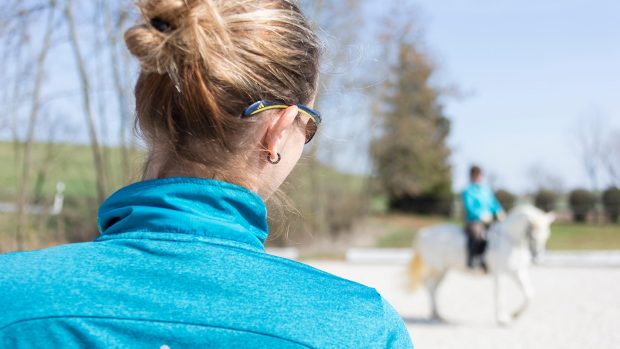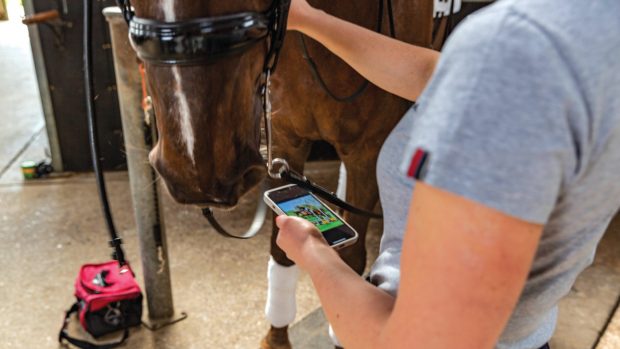Increasing numbers of advertisers have contacted Horse & Hound after being approached by individuals involved in attempted internet-based scams.
Some horse owners who have advertised their animals online have received dubious offers from “buyers”. The buyers (almost always based overseas) promise to send a cheque that more than covers the cost of the horse and shipping, before asking the vendor to wire the excess amount back to their “agent”. The cheques, if they arrive, bounce.
“No one buys a horse unseen, so it rang alarm bells straight away,” said Maria Featherstone, who was contacted by “Bobby” via e-mail after advertising her Thoroughbred mare for sale.
She explained: “He said I was not to stress myself with worry about shipping — he would arrange it all. His accountant wanted my bank details so he could pay by banker’s cheque. I e-mailed him back saying: ‘You must think I’m stupid.’”
Ian Crofts received an e-mail from a Dr Bill McDonalds after advertising his dark bay Dutch dressage gelding for sale. In faltering English, Dr McDonalds offered to send a cheque for £24,750, from which Mr Crofts should deduct his payment of £19,750 and then “wire the excess amount to my shipping agent via Western Union money transfer”.
Mr Crofts forwarded the e-mail to the Office of Fair Trading (OFT). However, the OFT has no powers to assist individual consumers in their private disputes. Mr Crofts was advised to contact the internet service provider (ISP) from where the scam e-mail originated, and also to consult the police. The ISP concerned, Yahoo, said it had taken “appropriate action” against the account in question.
As no money or goods had been exchanged in either of these cases, no crime had taken place, explained police community support officer Mark Douglas, who advised Maria Featherstone.
He said: “The internet is quite often used for stuff like this, but sending these e-mails isn’t a crime in itself. Our advice to anyone selling anything is don’t hand over any goods until you’re happy that the payment has been made. And remember, if it seems too good to be true, it probably is.”
There is very little data available on the number of people who fall prey to these scams as they usually go unreported.
Andy Williams, H&H’s classified advertising manager, said that although these bogus buyers are a small minority, certain precautions are advisable.
He reasoned: “We always tell advertisers to ask for ID and a landline number. This way, if something does go wrong you can find the buyer.”
Both parties should sign a receipt, Mr Williams added, and online payments are both the quickest and safest method of transferring money.
Readers have reported experiencing problems advertising on numerous sites, including horseandhound.co.uk and The Pony Club.
“We do as much as we can to protect buyers, but we provide a platform for people to advertise their horses and there’s only so much you can do,” admitted Pony Club press officer Candy Burnyeat.
The New Forest Pony Breeders and Cattle Society and Irish Draught Horse Society websites also include e-mails from advertisers who have been approached by suspicious buyers.
The scams are not confined to equine advertisers. AutoTrader is the biggest-selling car magazine in the UK, advertising around 350,000 cars per issue.
“Criminals do use AutoTrader, so we have a whole set of precautions and initiatives in place to try to discourage them and prevent crime, including an online crime centre,” said Karen Hughes, the magazine’s media consultant. “It’s a small minority of people praying on car buyers or sellers. It is essential to use your common sense.”
Could your buyer be bogus?
Be wary if:
- The buyer is overseas, wishing to buy sight unseen
- The English in the e-mail is poor
- Is the phrase last price or best price included?
- Is the buyer proposing to send you MORE than the cost of purchase and shipping?
Better to:
- Insist on exact payment only
- Request a phone number and address
- Under no circumstances, part with goods until payment has COMPLETELY cleared
- Alert the internet service provider (ISP) from which the e-mail was sent
For more information and advice on the issues raised in this article, visit:
www.horseandhound.co.uk/horsecare/buying/tag/Horse_buying_scams
www.oft.gov.uk/Consumer/Scams/default.htm
www.autotrader.co.uk/CARS/selling/dealing_with_buyers.jsp
This article was first published in Horse & Hound (28 December, ’06)




